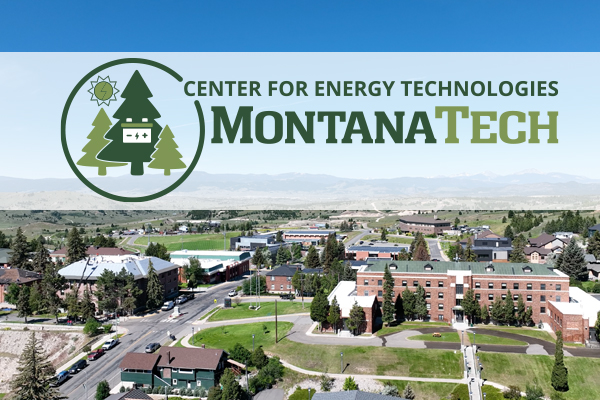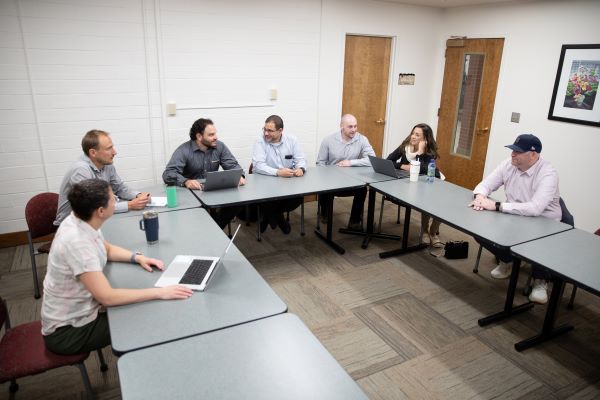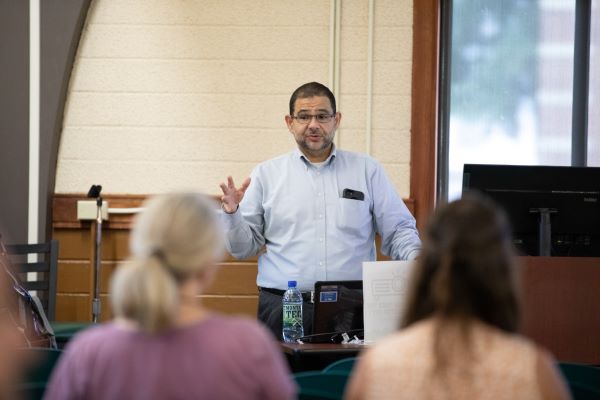Montana Tech secures $7.5 million NSF grant to launch Center for Energy Technologies

BUTTE, Mont.— Montana Technological University has secured a $7.5 million grant from the U.S. National Science Foundation (NSF) to establish the Center for Energy Technologies (CET), a new research hub focused on energy systems. Funding for the project, which begins September 1, 2025, was secured through a highly competitive NSF grant. The five-year award is part of the EPSCoR Centers of Research Excellence in Science and Technology (CREST) Phase I program.

Dr. Luis Cubano, of the National Science Foundation, speaks with the Center for
Energy Technology researchers.
NSF CREST EPSCoR Center awards are designed to strengthen the STEM capacity of Emerging Research Institutions (ERI) by establishing integrated research and education centers. These awards support the creation of new scientific knowledge and boost the research productivity of individual faculty members. The awards also pursue a mission to enhance the research competitiveness of targeted jurisdictions.

Dr. Luis Cubano, of the National Science Foundation, speaks at Montana Tech.
“This NSF award is a major step in expanding Montana Tech’s research capabilities in energy technologies,” Interim Vice Chancellor for Research and Dean of the Graduate School Dr. Katie Hailer said. “It gives our faculty and students the resources to tackle problems that matter to our region while building new opportunities for collaboration. I’m grateful for the hard work and commitment our faculty put into making this grant possible.”
Led by principal investigator Dr. Richard LaDouceur, the center brings together a multidisciplinary team of researchers from Montana Tech—including Dr. Jack Skinner, Dr. Jessica Andriolo, Dr. John Kirtley, and Dr. Blaine Berrington—as well as collaborators from the University of Montana, who will provide external evaluation, support and assessment.
“The funding from the National Science Foundation provides for an opportunity to build knowledge across multiple disciplines for the students who come to Montana Tech in energy technologies,” LaDouceur said. “The hope is to create a truly multidisciplinary culture for our students to solve the problems that our region faces in terms of rural power, forest management, and batteries in the cold weather environment that we live in.”
Under the new center, Montana Tech researchers aim to develop technologies that can be deployed locally to convert biomass, like beetle-killed trees, into biochar and renewable energy, such as heat and electricity. The concept involves using forest waste in pyrolysis systems that generate gaseous fuels useful for electricity generation through solid oxide fuel cell technologies, while producing solid and liquid byproducts useful in battery storage and soil enhancement.
“We're trying to take what would otherwise be waste from our forests that increase the risk for fires and turn it into something productive and useful,” LaDouceur said. “It’s a win-win: reduce fire risk, and create sustainable power systems.”
The center will not only advance research, but also serve as a training ground for undergraduate and graduate students, who will gain hands-on experience in multiple STEM disciplines.
For LaDouceur and the team, the center is about more than technology— it’s about making a difference.
“We want this center to have a real impact in our region,” he said. “This is science that matters to Butte, to Montana, and to communities facing the same challenges across the country.”
“This long-term support from NSF for energy research at Montana Tech is incredibly timely and valuable,” Dean of the Lance College of Mines and Engineering Dr. Jack Skinner said. “The Lance College of Mines and Engineering, in collaboration with the College of Letters, Sciences, and Professional Studies and Highlands College, is purposefully extending our institution’s reach and impact as leaders in the energy field. This is an exciting time to be a part of Montana Tech.”
“After more than a decade as a research scientist in the Montana Tech Nanotechnology Laboratory, I’m honored to contribute to this NSF-funded project advancing cold weather technology research and education,” Research Associate Dr. Jessica Andriolo said. “This initiative stands out as one of the most applied and impactful efforts for the state of Montana that I’ve been a part of. Our team of principal and co-principal investigators brings exceptional expertise and energy, and I’m excited for the important work ahead.”
“The initial concept was a bit of divine inspiration from several years ago that I brought forward to Rick as a potential collaborator,” Associate Professor of Chemistry Dr. John Kirtley said. “The concept and collaborative team quickly grew, resulting in an ultimately unsuccessful proposal submitted to NSF. However, we learned from the experience, and this early concept and hard work formed the foundation for this recent award. We have a great, synergistic team and look forward to working with everyone to create new opportunities for students, postdocs, and faculty at Montana Tech and beyond.”
“The CET project can provide tremendous benefit including designing real world solutions, supporting faculty research, and training new Montana scientists and engineers,” Dr. Beth Covitt, Head of Science Education Research and Evaluation with the Broader Impacts Group at University of Montana, said. “I’m delighted to begin working with Dr. LaDouceur and the Montana Tech team to document project advancements and impacts.”
“The newly established Center for Energy Technologies will build on Montana Tech’s already established tradition of emphasizing hands-on research experience that has exemplified our commitment to producing quality and prepared students,” Assistant Professor of Chemistry Dr. Blaine Berrington said. “Our ability to offer unique opportunities for our students that sets them apart grows even more from this effort. I look forward to having a role in training the next generation of the workforce through hands-on applied and fundamental research in energy technologies.”